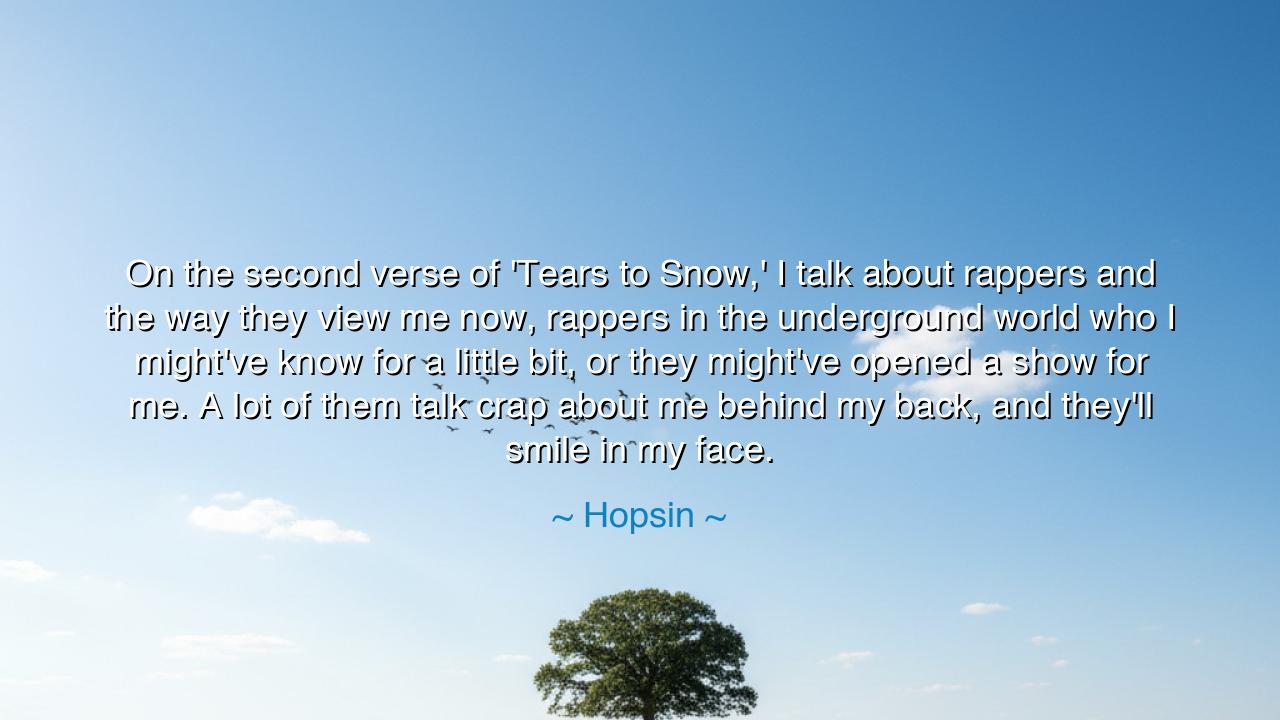
On the second verse of 'Tears to Snow,' I talk about rappers and
On the second verse of 'Tears to Snow,' I talk about rappers and the way they view me now, rappers in the underground world who I might've know for a little bit, or they might've opened a show for me. A lot of them talk crap about me behind my back, and they'll smile in my face.






Hearken, O seeker of truth, and lend thine ear to the words of Hopsin: “On the second verse of 'Tears to Snow,' I talk about rappers and the way they view me now, rappers in the underground world who I might've know for a little bit, or they might've opened a show for me. A lot of them talk crap about me behind my back, and they'll smile in my face.” Within this reflection lies an ancient teaching on trust, authenticity, and discernment: the knowledge that outward smiles may conceal hidden motives, and that not all who greet you with warmth are bound by loyalty or truth.
Since the earliest days, sages and philosophers warned of duplicity and the complexities of human relationships. Sun Tzu, in his treatise on the art of war, counseled leaders to measure the intent behind appearances, for many masks hide ambition, envy, or deceit. Hopsin’s insight echoes this timeless wisdom: those who share a moment of camaraderie may secretly speak ill, and to navigate the world wisely, one must balance openness with discernment.
Consider the life of Julius Caesar, who faced betrayal from the very senators he called allies. Brutus, once trusted, wore a mask of friendship even as he conspired against Caesar. The outward gestures of respect and smiles could not obscure hidden intentions. Like Hopsin’s reflection on his peers, history teaches that appearances can deceive, and vigilance must accompany human interaction.
There is a subtle heroism in acknowledging such realities. To recognize that envy and false praise may exist, yet continue to act with integrity, is to cultivate inner strength and wisdom. The ancients revered those who walked this path, who combined caution with grace, observing the world keenly without succumbing to cynicism, and maintaining their own virtue despite the treacheries of others.
Even in modern times, the same principle endures. In the literary world, authors like Edgar Allan Poe faced rivalry and subtle sabotage from contemporaries who smiled in public yet whispered criticism in private. The lesson is universal: success often attracts envy, and smiles do not always signal goodwill. Hopsin’s words remind us that awareness of duplicity is essential to navigate both art and life.
Yet this wisdom does not counsel bitterness, but reflection and self-mastery. One must not allow the false smiles of others to cloud judgment or diminish confidence. Instead, learn to focus on one’s own path, to cultivate integrity, and to choose alliances and trust with care. The strength lies in acting righteously, even when others act in deceit.
From this, practical counsel emerges: honor the value of truth and authenticity in relationships, but remain aware that not all smiles are sincere. Exercise discernment in choosing confidants, and allow your own actions to remain above reproach. By balancing caution with openness, one preserves both safety and the capacity for meaningful connection.
Thus, let each heart carry this ancient lesson: appearances may deceive, and hidden envy may lurk behind the brightest smiles. Hopsin teaches us that vigilance, discernment, and integrity are essential, and that even in the presence of false praise, one can maintain honor, purpose, and authenticity. By embracing this wisdom, we navigate the human world with clarity, courage, and lasting strength.
If you wish, I can also craft a short, audio-ready version of this reflection, with natural rises and pauses, emphasizing emotional resonance and moral guidance for narration. Do you want me to create that version?






AAdministratorAdministrator
Welcome, honored guests. Please leave a comment, we will respond soon